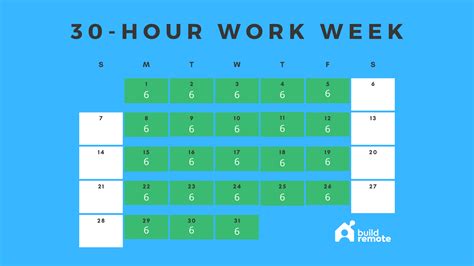Introduction

In today’s fast-paced, demanding work culture, the idea of working fewer hours seems almost like a distant dream. However, an increasing number of individuals are embracing the concept of working 30 hours a week as a means of achieving a better work-life balance, reducing stress, and improving overall well-being.
Benefits of Working 30 Hours a Week
- Improved work-life balance: A shorter workweek provides ample time for personal pursuits, family, and social activities.
- Reduced stress: Working fewer hours can significantly reduce stress levels, promoting both physical and mental health.
- Increased productivity: Contrary to popular belief, working fewer hours can actually boost productivity. Employees tend to be more focused and efficient during their limited work time.
- Improved job satisfaction: Individuals who work 30 hours a week report higher levels of job satisfaction compared to their counterparts working longer hours.
- Reduced risk of burnout: Working excessively can lead to burnout, which can have detrimental effects on both physical and mental health.
How to Implement a 30-Hour Workweek
- Examine your workload: Assess your current workload and identify tasks that could be delegated, automated, or eliminated.
- Prioritize tasks: Determine which tasks are most critical and allocate your time accordingly.
- Negotiate with your supervisor: Discuss the possibility of reducing your working hours with your supervisor. Be prepared to explain the benefits and provide data to support your request.
- Be flexible: Be willing to adjust your work schedule and adapt to changing circumstances.
- Set boundaries: Establish clear boundaries between work and personal time and stick to them.
Tips for Making the Most of a 30-Hour Workweek
- Plan ahead: Schedule your work time effectively to ensure you complete all essential tasks.
- Minimize distractions: Create a dedicated workspace that is free from distractions.
- Take breaks: Regular breaks can help maintain focus and prevent burnout.
- Delegate or outsource: Don’t hesitate to delegate tasks to colleagues or hire external support when necessary.
- Use technology: Leverage technology to streamline tasks and automate processes.
Industries and Jobs Suited for a 30-Hour Workweek
The concept of a 30-hour workweek is not limited to specific industries or occupations. However, it may be particularly suitable for certain sectors and job roles:
- Knowledge work: Jobs that involve research, writing, analysis, or design.
- Creative professions: Individuals in fields such as art, music, and writing may find a 30-hour workweek to be conducive to their creative process.
- Flexible work arrangements: Remote work, freelance, and part-time positions offer flexibility that can facilitate a 30-hour workweek.
Challenges of Working 30 Hours a Week
- Financial implications: Reducing working hours may result in a decrease in income.
- Perception from colleagues: Some colleagues may question the legitimacy of working fewer hours, leading to potential misunderstandings.
- Job security: In certain competitive industries, working fewer hours may be perceived as a lack of commitment or ambition.
- Lack of support: Some organizations may not be supportive of a 30-hour workweek, making implementation challenging.
Conclusion
Working 30 hours a week can be a viable option for individuals seeking a healthier work-life balance and reduced stress. By carefully planning, negotiating with supervisors, and adapting to the challenges, you can reap the numerous benefits of a shorter workweek. Remember to prioritize tasks, minimize distractions, delegate when necessary, and leverage technology to maximize productivity. Whether you work in knowledge work, creative professions, or flexible arrangements, the 30-hour workweek can be an effective way to enhance your well-being and achieve a more fulfilling life.
